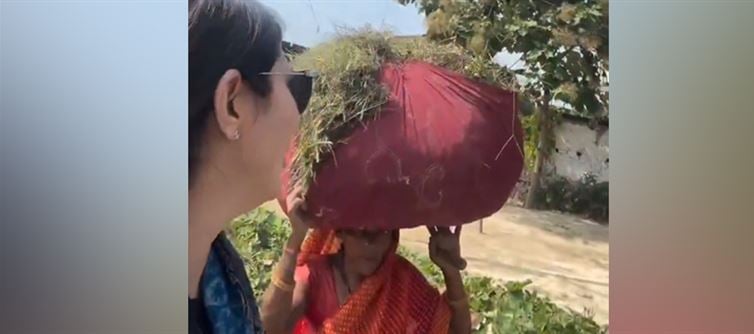
It was meant to be yet another “Modi ji touched our lives” tv segment — the kind that usually ends in a rehearsed smile and a headline about government generosity.
But what Chitra Tripathi got instead was a national embarrassment — an unfiltered, unscripted reality check from women carrying heavy loads in the blazing heat. What was supposed to be manufactured praise turned into a public rejection, and what unfolded on camera has now become a case study in media servitude gone wrong.
1️⃣ The Scene: Poverty, Heat, and a Camera Crew
In the sweltering sun, a few women — visibly tired, sweating, and carrying heavy goods on their heads — were suddenly stopped by Chitra Tripathi, one of India’s most recognizable faces from the Modi-era news machine.
Instead of offering them water, shade, or even empathy, she began what looked like a politically guided PR session: asking about the ₹10,000 given by Modi ji, clearly fishing for soundbites that would glorify government benevolence.
2️⃣ The Script Backfires
What happened next could make any propagandist weep.
Instead of parroting “Modi ji gave us help,” the women replied with raw honesty — praising Lalu Yadav and even declaring they would vote for him, right in front of the camera. The contrast was stunning: a journalist trying to frame a success story, while the real india spoke truth to power — and to the camera.
3️⃣ The Peak of Shamelessness
Critics online have rightly called it “pukeworthy.”
Stopping exhausted women in their tracks just to coax political praise — that too under a burning sun — isn’t journalism; it’s emotional exploitation in high definition.
Tripathi’s body language, tone, and persistence screamed desperation — not curiosity. Every question seemed less about truth and more about manufacturing consent for the cameras.
4️⃣ Social media Doesn’t Forgive
The clip spread like wildfire across social media, igniting outrage.
Viewers called it “the perfect metaphor for indian tv news” — journalists chasing the narrative, not the news. Hashtags mocking “Godi media theatrics” began trending within hours. What was meant to be a segment of praise turned into a viral slap of reality.
5️⃣ When Journalism Becomes PR
Once upon a time, reporters were supposed to challenge power. Today, too many act as microphones for it. Chitra Tripathi’s episode is more than just an embarrassing clip — it’s a mirror showing how sections of India’s mainstream media have traded integrity for access.
When poverty becomes a prop, when the suffering of women becomes a backdrop for political messaging, you know something has rotted deep inside the newsroom.
6️⃣ The Unintended hero Moment
Ironically, the women — uneducated, unheard, and unbothered by the camera’s pressure—became the day’s true journalists. Their raw answers, unscripted and unafraid, exposed what decades of prime-time shouting couldn’t: that truth still exists outside studio lights, carried in the voices of people who refuse to perform for propaganda.
7️⃣ A Nation Watching the Facade Crack
For viewers, the message is clear: India’s “neutral media” mask is slipping fast.
Every forced interview, every choreographed “Modi praise” moment only fuels the distrust between citizens and the press.
What Chitra Tripathi thought would be a feel-good segment ended as a symbol of televised servility — and a warning to those who still think people can be scripted like press releases.
🔥 CLOSING SHOT:
Chitra Tripathi tried to make poor women praise Modi.
Instead, she made india see who really carries the weight — literally and metaphorically.
No amount of spin can undo the raw honesty of that clip — because for once, the truth didn’t need a teleprompter.




 click and follow Indiaherald WhatsApp channel
click and follow Indiaherald WhatsApp channel